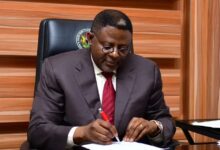
Assistant Director-General of the World Health Organisation (WHO), Dr. Chikwe Ihekweazu has called for local investments in domestic institutions to drive health security.
He made the call in Abuja on Thursday while delivering a keynote address at the second APIN Public Health Initiatives’ Annual Health Symposium.
The symposium has “Securing our Future: Strengthening Global Health Security in Nigeria” as its theme.
Ihekweazu who oversees the Division of Health Emergency Intelligence and Surveillance Systems at WHO, said that investment in domestic institutions would engender better understanding of health crisis and drive progress.
He added that it would also build capacity to better understand infectious diseases and how they are to be fixed.
“While foreign partners have a role to play, the ultimate responsibility must rest with us and how we are building and empowering our institutions.
“To do this, countries must put down their own money to act on these challenges and not outsource our problems so completely”, he said.
Ihekweazu also said that the power of institutions were the bedrock of sustainable progress as they hold systems together, and would be the bridge for a stronger nation.
“We need to focus on strengthening our institutions, not just for today’s crisis, but for tomorrow’s unknowns.
“Ultimately, our ability to respond to epidemics, to absorb resources and to transform lives, depends on the strength of the institution”, he explained.
The one time Director-General of the Nigeria Center for Disease Control (NCDC), Ihekweazu stated that strong institutions were not just about responding to an immediate crisis, but about the ability to absorb development resources.
The Coordinating Minister of Health and Social Welfare, Prof. Muhammad Pate, said that the Federal Government was working towards a “One Health” approach to ensure that it has unlimited resources to be able to integrate all programmes and tackle health issues with effective response.
Represented by the Director, Port Health Services, Dr. Nse Akpan, Pate said this was important in order to contain and eliminate all diseases of importance in the country.
He added that long term plans were in place to ensure that the elimination and eradication were achieved.
Pate said that he was glad the country was facing its health challenges head-on, as a time may come when development partners may not be able to come to the country’s aid.
Speaking about the symposium, Dr Prosper Okonkwo, the Chief Executive Officer (CEO) of APIN, said that it was aimed at providing a platform for stakeholders to talk about global health security.
Okonkwo informed that a lot of new diseases had emerged due to climate change, while those that had declined were re-emerging, giving rise to concerns.






